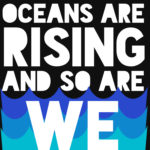As always the good fellows (ahem and lady) at Southern Friend Science are tackling complex issues and generating discussion. The latest from Why Sharks Matter “If you want something done right, do it yourself” address the role of scientists in advocacy. Science Online 2010 did much to bring this to the foreground for me as I begin to shape my research program for the next five years. DSN and public outreach continue to be integral to my overall science program. The days of scientists not engaging the public are long over. I commented at Science Online in Miriam’s SEAPLEX session that to get NSF funding you not only had to do outreach, but do it well.
I do disagree with WhySharksMatter though.
I keep hearing of this mythical scientist/purist who believes that outreach and advocacy are unimportant. Frankly, I just don’t see this. I am surrounded by scientists who continuously convey passion about science to the public. Sure there are the naysayers among the ranks who down play this component but for everyone of them there are two who do not. No longer can our default comment or excuse be that scientists do not want to or cannot effectively engage the public. The magnitude of scientists on the web, at ScienceCafes, on Twitter, in your newspapers, writing books, and giving lectures is without precedent. Public engagement has become vital to our research programs. We enjoy doing it and we do it often.
I am also frustrated by those who’s 40+ hour a week job is to communicate science to the public criticizing scientists for not spending even more time on this. Meanwhile scientists are balancing the demands of teaching, administration, research, and of course outreach. Please support instead of disenfranchising us.
I want to finish on another thought about the post over at Southern Fried Science. We should be careful to discuss outreach and advocacy individually. Each presents unique issues and engage the public differently. Advocacy is the “active support of an idea or cause etc.; especially the act of pleading or arguing for something”. On the other hand, outreach or public engagement is “is an effort by individuals to connect ideas or practices to groups, specific audiences or the general public.” Advocacy comes with an agenda and you become a stakeholder in that process with a bias. Outreach should be to convey information but free from other agendas. All scientists should engage in outreach, advocacy should be considered carefully.
The comments section is always open…so go at it.






This sounds in no small part like the debate I regularly have in my head about my own blog. “More time blogging!” shouts one hemisphere. “More time on your research” shouts the other. And then the question that lurks in every postdocs heart “But will it help me get a job?” And I really don’t have an answer to that one way or another. Also, different professors of different ages/persuasions will also give one different answers.
So, yes, for the scientist trying to reach out a bit, its a never-ending balancing act. I’m still not sure what is the right one, nor how much training one needs to do it well. Indeed, like all things in science, some folk just get it, while others need to really be trained. And then there are the vast unwashed scientific masses who fall squarely in the middle.
Fortunately, I think 95% of the grad students anywhere know that outreach is crucial. Heck, in some ways, its the new generational divide in the field. But I think it’s playing out well.
I’ve rarely encountered the scientist/purist who doesn’t care about outreach at all, but I’ve often encountered the well-meaning scientist who thinks that the public will enjoy looking at 10,000 figures on Powerpoint slides. Not all scientists are equally good at outreach, and not all are willing to pay the price in resources and time. There needs to be a way to reward good public communicators – like maybe with a job upon graduation. :)
Thanks for the post, but I think there’s another aspect — advisory service — that can’t be completely pigeonholed into either advocacy (advocating a position) or outreach (communicating science to the non-science public). Especially in fisheries, and in lots of other marine-related fields to a lesser extent, there should be an emphasis to get non-government scientists involved into the management processes whenever possible. This could (and often does) range from presenting new and relevant data, actually helping with stock assessments, or even membership on constituent advisory panels to make sure the relevant scientific points are emphasized in that advising of the government agency and not drowned out in populist constituent group talking points.
In a shameless pimping moment, I’ll talk a bit about this last idea when I speak at DUML next week on fisheries bycatch research.
FishGuyDave,
Excellent point! Advisory service would be a third.
Hear hear! I’ll be sure to emphasize the outreach/advocacy distinction the next time this subject comes up. During discussion with our professors, my fellow students and I have been cautioned against treading down the advocacy path – but without outreach being presented as a viable and necessary option for channeling our passion and desire to “do more” for the bigger picture. We all realize the value of outreach, but have yet to highlight how it differs from advocacy in conversation with our “old school” advisers – well said!